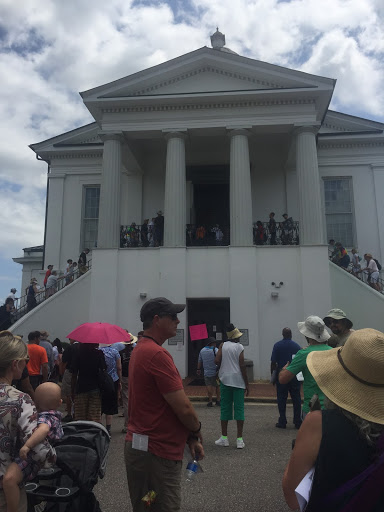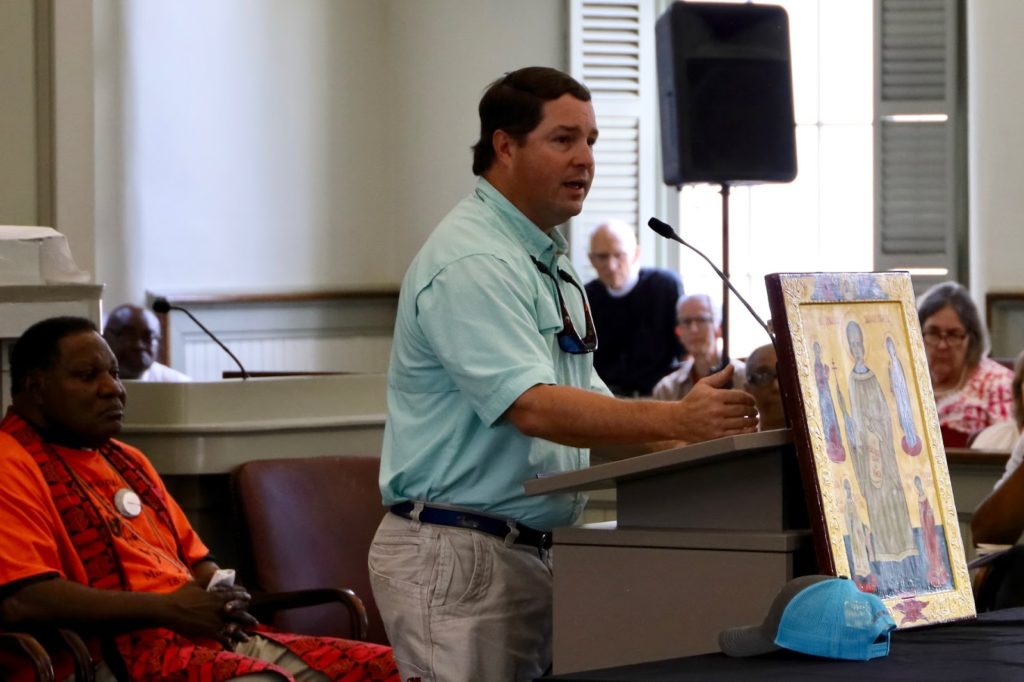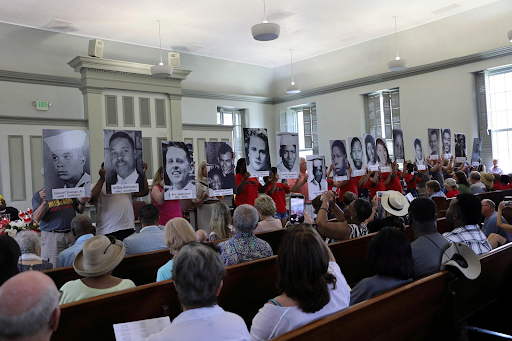In August 2019, members of the community of Seminary of the Southwest attended the annual Jonathan Daniels Pilgrimage in Hayneville, Alabama, in remembrance of Episcopal Church martyr Jonathan Myrick Daniels. One of the most recognized pilgrimages in The Episcopal Church, people from many dioceses and seminaries across the country come to the spot where Daniels, an Episcopal seminarian from Keene, New Hampshire, was shot to death in August 1965 trying to protect an African-American teenage girl.

The Pilgrimage begins each year in front of the courthouse in Hayneville, the place where an all-white jury in less than an hour found Jonathan’s murderer, Tom Coleman, not guilty. Pilgrims march to the jail where Daniels and his companions were held, to the place where he was killed at a small country store that has since been razed, and then back to the courthouse.
Southwest’s involvement this year began at the urging of MDiv Senior, Andrew Brislin. “I first attended the Jonathan Daniels Pilgrimage in August of 2009, not long after I was confirmed into The Episcopal Church. I was invited by a friend who was leading a group from our parish. Having been born and raised in Selma, AL, I wanted to learn more about this person the church celebrated who was killed not far from my home. As I walked from station to station in the hot August heat and humidity and listened to portions of Outside Agitator being read, vividly describing the events of that August summer in 1965, I began to get chills. As I first kneeled at the concrete apron in front of the Cash’s Store that no longer stands, I began to sense the presence of something that I could not quite explain,” said Brislin. “After my arrival in Austin, I learned that Southwest was established by Bishop Hines to be a multi-racial and multi-cultural institution to form leaders for the church. I began to think about my own experiences of growth and what had helped to begin to form me and I naturally reflected on my experiences pilgrimaging to Hayneville.”
The Rev. Jane Patterson, Associate Professor of New Testament and Director of Community Care, was among the faculty that made the journey. “One of the things that stick in my memory from our time together was the sense of the palpable presences of the people who suffered in the streets, warehouses, markets, and fields of America, the people whose suffering undergirded the whole financial structure of 19th century America – not only where they were physically present, but also everywhere that money flowed, both in the north and the south,” recalled Patterson.
In a moving Eucharist, the judge’s bench of that 1965 trial became the altar on which the sacrament was consecrated. Fourteen other martyrs of the Alabama civil rights movement are recognized and honored in this service as well as Daniels. It was an Eucharist which resonated greatly with those in attendance.
“The Hon. Adrian Johnson is the presiding judge of the courtroom and was asked to speak a few words during the service. He spoke about the killer of Jonathan Daniels being indicted for manslaughter (a misdemeanor), not murder, and said he’s been asked how this verdict happen. His answer: complicity. We internalize the divisive and racist narratives to justify the perpetual racial violence. We keep silent when we should speak again wrong actions. Judge Johnson observes that 54 years later, we’re still dealing with the same level of complicity and he faces this in his courtroom constantly, saying it needs to end (for which he received a standing ovation). He urged us to learn from the lessons of our history and do things differently,” said MDiv Middler, Susan Oakes.

Corrie Cabes, an MDiv Middler, was particularly affected by a youth group visiting from New York. “I was particularly struck by the large photographs of smiling children that were being held up, these were photographs of the identified young martyrs of Alabama of the 1960’s. It seemed fitting and very poignant to me that at the pilgrimage it was children, youth from the Diocese of New York, that were holding these images, preparing to take part in the walking, praying, singing, mourning, and remembering,” said Cabes. “I had to wonder, what did it feel like for these teens carrying photographs of people that died, so tragically, that were their own age? Did they feel inspired that day to make their own way towards justice and peace? Were they angry that day, knowing that the evil of racism still infects us?”

The Rev. Daniel Joslyn-Siemiatkoski, Southwest’s Duncalf-Villavaso Professor of Church History, was struck by the persons in attendance at the pilgrimage, including Richard Morrisroe. “If Jonathan Daniels is a martyr, then Richard Morrisroe is a confessor,” said Joslyn-Siemiatkoski. “Richard Morrisroe was a Roman Catholic priest who was arrested alongside Jonathan Daniels, Ruby Sales, Joyce Bailey, and others at the Fort Depot protest in Alabama in August 1965. After their release from the county jail in Hayneville, AL, these four approached Verner’s Cash Store where they were met by Tom Coleman brandishing his shot gun. While Jonathan Daniels was killed while protecting Ruby Sales, Richard Morrisroe was gravely wounded as he grabbed Joyce Bailey’s hand and ran away with her. Richard was transported to Montgomery with Jonathan’s dead body on him. Richard almost died at the hospital because white doctors refused to treat since he was seen as an outside agitator betraying the white status quo. To this day, Richard Morrisroe bears the marks of his witness to God’s call for justice and reconciliation. He serves as a reminder to me of the true cost of discipleship and a testimony of what a faithful life looks like.”
“I am very glad and grateful that the students and faculty organized to join the Jonathan Daniels Pilgrimage this summer. The experience promises to inform our expanding work in the area of racial reconciliation at the seminary and in the wider community,” said the Very Rev. Cynthia Briggs Kittredge, dean and president.
In a related note, the student-run Harvey Lectures in Spring 2020 will feature Civil Rights Era activist Ruby Sales.

